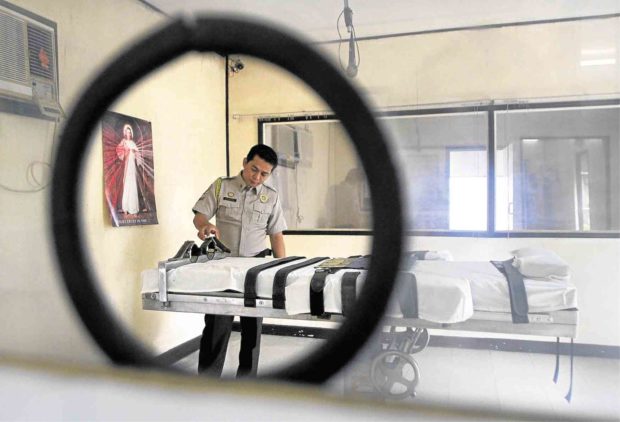Death penalty revival remains Palace priority despite Pope’s call

ROOM FOR THE DOOMED The unused lethal injection chamber at the New Bilibid Prison in Muntinlupa City, in a file photo taken during the 12th World Day Against the Death Penalty on Oct. 10, 2014. —LYN RILLON
Restoring the death penalty remains a priority of the Duterte administration, despite the Vatican’s pronouncement that it is “inadmissible” in any circumstance.
“It is still a priority of this administration to restore the death penalty for serious, drug-related offenses,” presidential spokesperson Harry Roque said in a press briefing on Friday, a day after Pope Francis approved a change in Catholic catechism that had previously accepted capital punishment as a “last recourse … [to] effectively defend human lives against the unjust aggressor.”
The new teaching in Catechism No. 2267 now says there are other ways to protect the common good, and that the Church should commit itself to working to end capital punishment.
According to the new text, “the Church teaches, in the light of the Gospel, that the death penalty is inadmissible because it is an attack on the inviolability and dignity of the person.”
The Church acknowledged that it had “long considered recourse to the death penalty on the part of legitimate authority and following a fair trial … an acceptable, albeit extreme, means of safeguarding the common good.”
Article continues after this advertisementBut it added that “[t]oday, there is increasing awareness that the dignity of the person is not lost even after the commission of very serious crimes.”
Article continues after this advertisementPope Francis has long opposed the death penalty, saying that the execution of a human being is fundamentally against the teachings of Christ because, by definition, it excludes the possibility of redemption.
Feeds vengeance
“It doesn’t give justice to victims, but it feeds vengeance,” the Pope said in June 2016, arguing that the biblical commandment “thou shall not kill” applies to the innocent as well as the guilty.
The death penalty was abolished in the Philippines in 2006 but President Duterte has been actively pushing for its restoration despite resistance from the Senate.
Roque said the decision now lay with the Senate, but that the President would try “gentle persuasion” to convince the lawmakers of the need for the death penalty.
In a text message to reporters on Friday, Senate President Vicente Sotto III said he would “try to find some kind of a compromise,” to convince his colleagues to support the death penalty bill.
Sotto earlier said senators would be more likely to support the bill if the death penalty only targeted high-level drug traffickers.
But in a separate message to reporters, former Senate President and Duterte party mate Sen. Aquilino Pimentel III categorically said the Senate “won’t reimpose the law.”
Sen. Francis Pangilinan, meanwhile, reiterated the stand of the Liberal Party (LP) in opposing the restoration of the death penalty.
“We do not see it as a deterrent to crime,” the LP president said.
Heinous crimes
The Senate seemed “somewhat divided on the issue,” Sen. Sonny Angara said.
Although the House passed a bill reviving the death penalty for major drug offenses in March 2017, it has remained at the committee level in the Senate.
At the House of Representatives, Buhay Rep. Lito Atienza said he “welcomes the Pope’s pronouncement,” and hoped the government would stop pushing for the return of capital punishment.
Allowing the death penalty violates the Constitution and the government’s treaties with the United Nations, Atienza said, adding that proponents of capital punishment “transcended God who created human life.”
Under the 1987 Constitution, the death penalty shall not be imposed but Congress may pass a law prescribing death for heinous crimes.
The Philippines, a predominantly Catholic country, has a history of invoking and suspending capital punishment.
Four months after the declaration of martial law in September 1972, the late dictator Ferdinand Marcos ordered the execution of notorious drug lord Lim Seng to serve, Marcos said, as a deterrent against the growing drug menace.
Between 1946 and 1965—the year when Marcos became President—35 people were executed for crimes committed with “senseless depravity” or “extreme criminal perversity.”
From 1971 to 1972, several laws were passed and presidential decrees issued that made hijacking, drug offenses, car theft, subversion, illegal possession of firearms, arson, embezzlement and illegal fishing capital crimes.
In 1987, former President Corazon Aquino abolished the death penalty “unless for compelling reasons involving heinous crimes, [and] Congress hereafter provides for it.”
Lethal injection
In 1993, Congress passed Republic Act (RA) No. 7659, which reimposed capital punishment. The law was amended in 1996, prescribing lethal injection for those convicted of heinous crimes.
Between 1999 and 2000 during the term of then President Joseph Estrada, seven inmates were put to death as part of the administration’s anticrime drive.
In June 2006, then President Gloria Macapagal-Arroyo signed RA 9346 and abolished the death penalty, saying it had not proven to be a deterrent to crime.
Although more than two-thirds of countries around the world have abolished or suspended judicial killings, the human rights organization Amnesty International has recorded at least 2,591 death sentences in 53 countries and nearly 1,000 executions in 2017 alone, excluding those unreported in China. —WITH REPORTS FROM DJ YAP, JEROME ANING, INQUIRER RESEARCH AND AFP
Source: Inquirer Archives